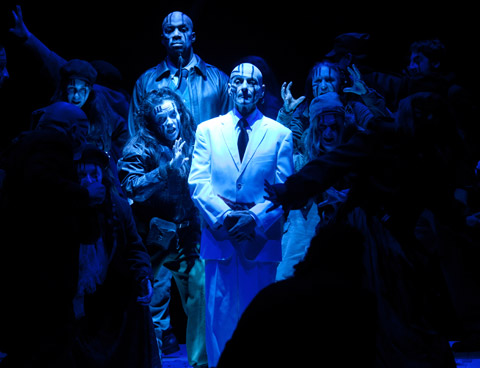
TOIL AND TROUBLE The BLO’s Macbeth takes strange — and distracting — liberties with Verdi’s opera. |
In music director David Angus's program note to the Boston Lyric Opera production of Verdi's Macbeth (at the Shubert through November 13), he suggests that because Verdi kept tinkering with the opera (adding some of its greatest music 18 years after its premiere), he would have given this version his blessing. I wouldn't agree. There's too much tinkering here with Verdi's first serious attempt to capture Shakespeare.For example: the aria that Verdi later added for Lady Macbeth (he even wrote the words), the harmonically complex "La luce langue" ("The light fades"), is one of opera's most searching arias of self-examination, scary because Lady M concludes that the evil she commits "is necessary." But as staged here by David Schweizer, Lady Macbeth sings it not to herself but to Macbeth, trying to convince him what to do, compromising the aria's intention and impact.
Lady Macbeth's entrance, as Verdi wrote it, is chilling: she's reading the letter from her husband informing her of the witches' prophecy. Unlike practically every opera ever written, we hear the soprano's speaking voice before we hear her sing. But here, it's Macbeth we hear reading the letter, like a movie voiceover. Not Verdi's intention.
Some departures from the score are even worse. Macbeth himself stabs the pregnant Lady Macduff in the stomach (isn't the point of becoming king that someone else does your dirty work?). Then he shoots Lady Macbeth after he finds her sleepwalking (or as a friend more accurately described it, he stabs her with his gun!). For some mysterious reason, King Duncan, a silent role, enters like A.R.T.'s Porgy, crippled, with twisted legs, and holding himself up with two canes (after he's murdered, he returns in a bloody white suit to do a sort of soft shoe).
Verdi's glorious score is excitingly conducted by Angus (his best work since he signed on as BLO's music director) and very well played, but what we see — bizarre-o Day of the Dead make-up and puppets (in Scotland?), and odd iconography — keeps leading us away from the music. All the stage busy-ness is relentlessly distracting. Yet the gorgeous ballet music Verdi added is gone because, as Angus puts it, it "hold[s] up the action." Even John Conklin's geometrical heavy-metal sets are raised and lowered at musically inopportune times, like just before the end of Lady M's Sleepwalking Scene. Has there ever been a Macbeth in which this moving aria didn't get a hand? Here the soprano gets upstaged by the scenery.
That soprano, Carter Scott, maybe shouldn't be singing this heavy role so early in her career. The basic color of her voice is lovely, even velvety, but her high notes are wobbly screeches, her low notes inaudible, and her pitch uncertain at best. I didn't believe her for a moment. But who can believe a Lady Macbeth who keeps putting her hands on her hips? (Does she think she's Carmen?) Her drinking song has her snapping her fingers, waving at guests, flirting, and shimmying. The director makes her sleepwalk in white pajamas (did I mention that this was all in some sort of modern dress?).